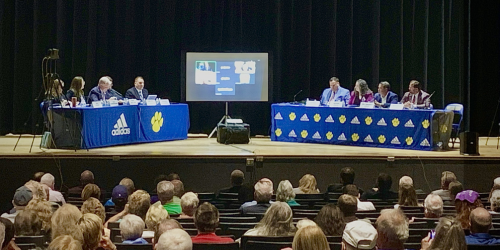
Scranton, Lackawanna County, PA -
At a public hearing on Monday regarding data center development in Northeastern Pennsylvania, John L. Augustine, President/CEO of Penn’s Northeast, said it is important to seize upon this “once in a lifetime opportunity.”
“But we must do it the right way,” Augustine said. “This is a high-tech industry that brings the high-paying jobs that so many of us have worked so long and hard to attract. As the regional economic development agency, Penn’s Northeast encourages our elected officials to look at the facts and not listen to the hype.”
The hearing was held by the Senate Majority Policy Committee at the Valley View High School auditorium in Archbald. Sen. Rosemary Brown, R-Monroe County, and Sen. Dave Argall, R-Pottsville, co-chaired the hearing, along with Sen. Lisa Baker, R-Lehman Township.
The purpose of the hearing was to discuss the economic benefits and potential negative impacts of data center development, ensuring decisions are made in the best interest of residents.
Participants included local elected officials, business and labor representatives, energy sector representatives, conservationists and economic development experts.
Augustine began his testimony by calling the arrival of data centers in NEPA “our 4th Industrial Revolution.”
Due to factors such as e-commerce, cloud computing, apps like Google Maps and Twitter, and the rapid growth of AI, Augustine said the region is experiencing its fourth generational opportunity - the data center era.
“Two years ago, we had one NDA (non-disclosure agreement), we now have seven, and we are actively working with or are aware of at least 15 data center companies interested in NEPA,” Augustine said. “These range from a single-use building to hyper-scale campuses with multiple buildings.”
Augustine said that with any new economic development. It is important to weigh the pros and cons and make decisions based on facts and not myths.
Augustine said, “So why us, why now? Two reasons — rapid growth of AI and computing power and location, location, location.”
Because it’s new to our region, Augustine said many people have many questions, and rightly so.
“It is important to know that every data center is different,” he said. “Every type of cooling system and every type of power generation is different. Local officials need to educate themselves and have honest, binding dialogue from the companies looking to locate in their backyards.”
Augustine said a second contributing factor is that NEPA checks all of the boxes.
“First, we have the power and a lot of it,” Augustine said. “Thanks to the Marcellus shale, we have a tremendous amount of clean burning natural gas. We are also fortunate to have a nuclear power plant generating gigawatts of electricity. PA is one of a few states that also enjoys other types of energy production like water, wind, and solar.”
Thanks to ongoing investments from utilities like PPL, Augustine said NEPA has a robust and reliable electrical grid for transmission, and companies like Comcast are continuing to build out strong fiber networks.
“We are also fortunate that lawmakers passed a data center tax credit in 2021, where computer equipment is exempt from Pennsylvania sales and use tax when it is sold to, used or consumed in a certified data center,” Augustine said.
Augustine also said NEPA has another contributing factor — ambient temperature.
“We are 20 degrees cooler on average than Texas,” he said. “This means that in our winter months, companies can use nature to help cool their facilities.”
Augustine said data centers have the ability to bring tremendous tax revenue and amazing opportunities to the region.
“Any location that has a data center should never have to raise its taxes again,” he said. “This is a huge benefit to our many citizens who are on a fixed income. And these centers attract ancillary businesses, boost local economies, and drive infrastructure upgrades — roads, broadband, utilities — enhancing regional prosperity.”
Key issues discussed included:
• Economic development: Potential for job creation, tax revenue, and economic growth.
• Environmental impact: Water usage, energy consumption, and potential pollution from backup generators.
• Infrastructure strain: Increased demand on the power grid and potential for higher utility bills.
• Community impact: Concerns about noise, traffic, and the overall quality of life in the affected communities.
• Regulatory framework: Need for fair cost allocation, transparent permitting processes, and responsible development guidelines.
“This hearing provided a critical opportunity for local government, state officials, and the public to come together and explore the facts surrounding data center development,” Brown said. “As this issue continues to spark strong opinions and concerns, it’s more important than ever that we engage in informed, constructive dialogue based on reliable information.”
“Locating data centers in Northeast Pennsylvania could improve our economy; however, we must ensure that our local communities are protected from any harmful side effects,” Argall said.
Other participants included:
• Merle Madrid, Sr. Manager, AWS Public Policy, Amazon
• Christine M. Martin, President, PPL Electric Utilities
• Robert F. Durkin, President, Greater Scranton Chamber of Commerce
• John Yudichak, President, Luzerne County Community College
• Tony Seiwell, International Representative, Laborers’ International Union of America
• Abby Smith, President & CEO, Team Pennsylvania
• Neal Lesher, Director of Government Affairs, Pennsylvania Chamber of Business & Industry
• Jonathan Lutz, Pennsylvania Associate Director, American Petroleum Institute
• Andrew D. Dehoff, P.E., Executive Director, Susquehanna River Basin Commission
• Kristen Bowman Kavanagh, P.E., Executive Director, Delaware River Basin Commission
• Patrick Henderson, V.P. of Government Affairs & Communications, Marcellus Shale Coalition
• Tony Nokovich, P.E., V.P. of Engineering, Pennsylvania American Water
• Holly M. Fishel, Policy & Research Director, PA State Assoc. of Township Supervisors
• Esch McCombie, Co-Chair, McNees Real Estate Group
• Kristopher J. Gazsi, Assistant Director & Counsel, Pennsylvania Local Government Commission
• Martin A. Toth, Associate Counsel, Pennsylvania Local Government Commission
• G. David Sload, President & CEO, ABC Keystone Chapter
• George Hayden, President, Hayden Power Group